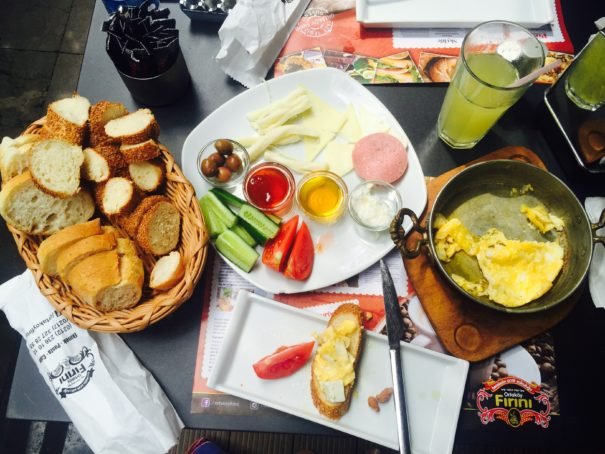
Today in She Said It, Not Us: “Turkish Food Is a Disaster”

Today in She Said It, Not Us: “Turkish Food Is a Disaster”
A Spread in Istanbul
“Turkish food is a disaster,” an innkeeper in Bethlehem once told me. I’ve been living in Istanbul for a year, and my experience with its cuisine has ranged from bemused confusion to anthropological fascination. There’s pizza with ketchup and mayo, fries inside baked potatoes. I’ll never forget choco-doner, true to its name: a rotating hunk of chocolate on a spit shaved and served on a crepe.
The innkeeper’s words ring true to me, especially on the subject of Turkish breakfasts. There’s the salty cheese: tulum, kaşar, beyaz, to name a few. There’s pink salami; halal, of course. There’s bal kaymak (honey with cream), pekmez (a fruity syrup mixed with tahini), various jams and Nutella, along with cucumbers, tomatoes, and olives, all presented alongside a basket full of bread. The flavors work until they don’t. It’s all colorful and confusing, like my time in Istanbul.
Since the failed coup attempt, I’ve been going to Taksim Square to observe the celebrations there. The first night, I saw it packed in a way I’d never seen before: people climbed up Ataturk’s statue taking selfies and poured into Istiklal and Gezi Park. Some flashed the number four in memory of the massacre in Egypt’s Rabia Square. I’ll never forget the image of an elderly woman in black—her scarf tight around her chin, revealing only her nose and spectacles—waving a Turkish flag furiously, its staff towering over her short frame. She’d parked herself by a white van blaring the soundtrack for the night: REH-CEP TAY-YIP ER-DO-GAN, the speakers roared. She waved along, never missing a beat. When one arm tired, she switched to the other.
A week later, the main opposition party held their rally and by the look of it, a different crowd had arrived in the square. I saw rainbow flags, Turkish flags, signs calling for barış (peace). There was no mention of the president. I talked to a woman with spiky red hair about why she’d chosen to come that particular day. She didn’t hesitate, saying that she felt comfortable for the first time because “different” kinds of people were represented, people like her. The last time she’d been in Taksim was three years ago during the Gezi Park protests. This time she’d come for democracy, she said.
I’ve seen various pockets of Istanbul society begin to claim their piece of Taksim Square after years of absence. I can’t help but reflect on my time in the city: eating Syrian food in the conservative Fatih district, grabbing drinks in my neighborhood, Ortakoy, where you can find a church, a mosque, and a synagogue within blocks of each other. It’s hard not to feel warm and fuzzy when faced with such diversity. But sometimes I’m painfully aware of my place, and of those who might feel unwelcome because of a headscarf or a miniskirt, depending on the neighborhood. I’m reminded of the Turkish breakfast. Sometimes it works, sometimes not so much. It’s a scrumptious mess of a meal.